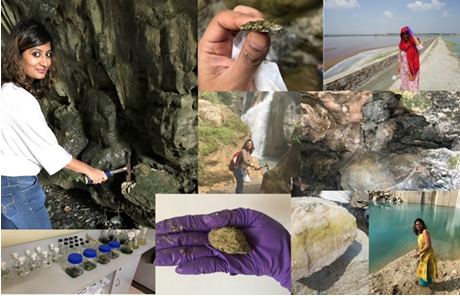A young scientist, Dr. Jyoti Singh, has unveiled the remarkable survival mechanism of Picocystis Salinarum, one of the smallest green algae, in extreme saline-alkaline/hyperosmotic environments. This groundbreaking discovery holds immense potential for biotechnological applications and opens up new avenues in understanding extremophiles.
Carbonates: A Cornerstone of Earth’s Processes
Carbonates play a crucial role in the global carbon cycle, captivating the attention of geoscientists, biologists, and climatologists alike. Carbon fixation, the process of converting inorganic carbon into organic carbon, is widely recognized as the cornerstone of biogeochemical transformations on our planet.
Unraveling Microbial Life in Extreme Environments
Dr. Jyoti Singh, an Inspire Faculty Fellow at the Department of Science and Technology (DST), is driven by her fascination with extremophiles. Her research delves into the world of microbial life, with a particular focus on photosynthetic cyanobacteria and microalgae that thrive in carbonate-rich environments such as carbonate rocks and soda lakes. These incredibly versatile microorganisms hold the key to unlocking critical questions related to biogeochemistry, microbial diversity, evolution, astrobiology, environmental sustainability, biotechnology, and beyond.
Deciphering the Resilience of Picocystis Salinarum
Dr. Singh’s team was captivated by the extraordinary ability of Picocystis Salinarum, found in the hypersaline soda lake Sambhar in Rajasthan, India, to flourish in extreme conditions. While this alga had been documented in saline-soda lakes worldwide, its presence in India was a novel finding.
Probing the Molecular Mechanisms of Adaptation
To uncover the mystery behind P. salinarum’s remarkable resilience, Dr. Singh and her team employed a high-throughput label-free quantitation-based quantitative proteomics method to investigate the molecular mechanisms of adaptation in such polyextreme environments.
Tailored Regulatory Mechanisms for Osmotic Adaptation
Their study provided the first insights into the proteome of the extremophilic alga P. salinarum, revealing its intricate regulatory mechanisms for osmotic adaptation and proliferation in polyextreme conditions of soda lakes. The findings shed light on the basis of resilience in this remarkable organism.
Enhanced Photosynthesis and ATP Synthesis
P. salinarum exhibits enhanced photosynthesis and ATP synthesis, along with chaperone proteins, as key responses to high salinity and alkalinity. This is particularly noteworthy as photosynthesis is typically suppressed under hyperosmotic conditions in most photosynthetic organisms.
A Promising Candidate for Biotechnological Applications
This groundbreaking discovery, published in Frontiers in Microbiology (Section Extreme Microbiology), positions P. salinarum as a promising candidate for biotechnological applications and as a model organism for deciphering the molecular mechanisms of osmotic adaptation.
Integrated Carbon Capture and Biomass Production
Dr. Singh’s team has also harnessed the unique characteristics of this microalga for bicarbonate-based integrated carbon capture and biomass production. Her research holds immense promise for the development of sustainable and resource-efficient biotechnological processes.
Inspire Faculty Fellow’s Research Paves the Way for Sustainable Innovations
Dr. Jyoti Singh’s research highlights the transformative power of scientific exploration in shaping a more sustainable future. Her work demonstrates the potential of extremophiles as a source of innovative solutions for addressing critical challenges in various fields, including biotechnology and environmental sustainability. Her groundbreaking discovery serves as a testament to the importance of fundamental research in uncovering the hidden secrets of the natural world.
